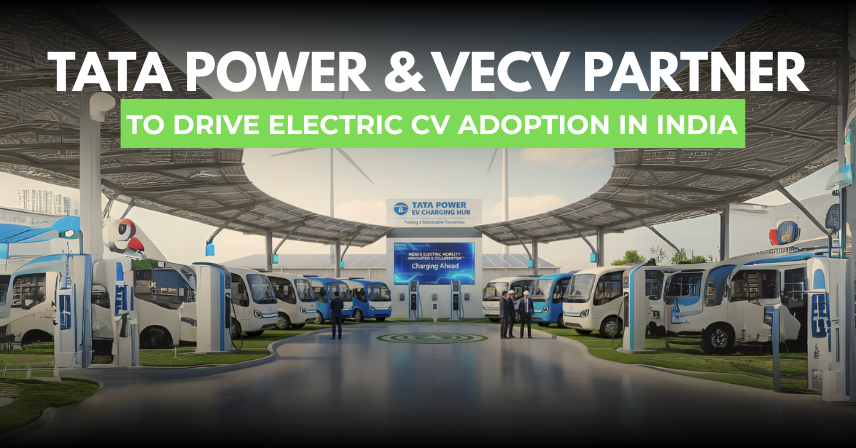India’s transition toward sustainable transportation just got a major push. Tata Power, one of the country’s leading integrated power companies, and VE Commercial Vehicles (VECV), a joint venture between Volvo Group and Eicher Motors, have partnered to accelerate the adoption of electric commercial vehicles (CVs) across India.
This collaboration aims to provide a robust EV charging infrastructure, energy solutions, and ecosystem support to fleet operators, businesses, and logistics companies. With India’s commercial vehicle sector contributing significantly to carbon emissions, this partnership is a timely step toward building a greener, cleaner future.
Why the Partnership Matters for India’s EV Ecosystem
The commercial vehicle segment in India—comprising trucks, buses, and light commercial vehicles—is a backbone of logistics, public transport, and last-mile delivery. However, it is also a major source of fuel consumption and air pollution.
The government’s FAME-II scheme and upcoming EV policies emphasize electrification of public and commercial fleets. But, adoption has been slower due to limited charging infrastructure and range concerns.
By bringing together Tata Power’s EV charging expertise and VECV’s commercial vehicle manufacturing strength, the partnership promises to address these critical challenges.
Key Highlights of the Tata Power–VECV Partnership
- EV Charging Infrastructure Development
- Tata Power will set up dedicated charging stations at VECV dealerships, fleet hubs, and highways.
- These chargers will be compatible with multiple vehicle categories including electric trucks and buses.
- Tata Power will set up dedicated charging stations at VECV dealerships, fleet hubs, and highways.
- Green Energy Integration
- Tata Power will enable renewable energy-based charging (solar, wind, hybrid solutions), ensuring true sustainability.
- This will reduce the carbon footprint of fleet operators significantly.
- Tata Power will enable renewable energy-based charging (solar, wind, hybrid solutions), ensuring true sustainability.
- Fleet Electrification Support
- VECV customers will gain access to charging solutions, battery management, and energy analytics.
- This ecosystem approach ensures smooth EV adoption for businesses.
- VECV customers will gain access to charging solutions, battery management, and energy analytics.
- Focus on Long-Term Sustainability
- Both companies are committed to supporting net zero emission goals by 2070.
- The partnership aligns with India’s climate action roadmap under COP26 commitments.
- Both companies are committed to supporting net zero emission goals by 2070.
Tata Power’s Role in India’s EV Journey
Tata Power has emerged as a pioneer in India’s EV charging infrastructure with its brand, Tata Power EZ Charge. With over 70,000 home chargers, 5,000 public charging points, and 1,200+ cities covered, the company is expanding aggressively to cater to both passenger and commercial vehicles.
Its expertise lies in:
- Fast-charging solutions for long-haul vehicles
- Solar-powered charging stations
- Fleet charging hubs for logistics companies
- Digital platforms for seamless charging experiences
This collaboration with VECV strengthens Tata Power’s presence in the commercial EV segment, where demand is expected to skyrocket in the next 5–10 years.
VECV’s Commitment to Electrification
VE Commercial Vehicles, a joint venture between Volvo Group and Eicher Motors, has been a leader in India’s CV manufacturing sector. With an emphasis on innovation and technology, VECV has already ventured into alternative fuel vehicles, hybrid buses, and advanced diesel engines.
Key contributions of VECV include:
- Manufacturing India’s first electric intercity coach
- Developing EV-ready platforms for buses and trucks
- Collaborating with logistics companies for pilot EV projects
By partnering with Tata Power, VECV ensures that its future EV lineup will be backed by reliable and widespread charging support, easing the adoption barrier for fleet operators.
Impact on Fleet Operators and Businesses
For logistics companies, transporters, and fleet managers, the partnership brings direct benefits:
- Reduced Operating Costs: EVs cost less to run compared to diesel vehicles, especially when combined with renewable charging.
- Increased Efficiency: Fast-charging stations reduce downtime and improve turnaround time.
- Sustainability Branding: Companies can align with ESG (Environmental, Social, and Governance) goals and attract eco-conscious clients.
- Government Incentives: EV adoption comes with subsidies, tax benefits, and lower road taxes.
This partnership also boosts confidence among e-commerce players, transporters, and bus operators, accelerating the shift to electric fleets.
Industry Significance
India’s CV market is projected to grow at a CAGR of 7–8% by 2030, with a large share shifting towards electrification. According to NITI Aayog, by 2030, 40% of buses and 30% of trucks could be electric.
The Tata Power–VECV alliance strengthens India’s EV roadmap by:
- Supporting urban electrification of buses for public transport
- Building EV-ready highways with long-haul truck charging stations
- Enabling last-mile green delivery for e-commerce and FMCG sectors
This move also positions India as a leader in green logistics solutions, reducing dependence on fossil fuels and cutting emissions.
Challenges and Road Ahead
While the partnership marks a significant milestone, there are challenges to overcome:
- High upfront EV costs for trucks and buses
- Battery technology limitations for long-haul transport
- Need for policy incentives and financing support
However, with strong players like Tata Power and VECV collaborating, these challenges can be addressed through innovation, scale, and government backing.
Conclusion
The partnership between Tata Power and VE Commercial Vehicles represents a transformative step in India’s journey toward electric commercial mobility. By combining Tata Power’s EV charging expertise with VECV’s manufacturing capabilities, the alliance paves the way for large-scale adoption of electric trucks and buses.
This collaboration not only supports India’s net zero ambitions but also helps businesses reduce costs, improve efficiency, and contribute to a cleaner environment.
As the EV ecosystem matures, such partnerships will play a crucial role in shaping the future of mobility in India.
For more updates like this visit www.commercialbhp.com.

